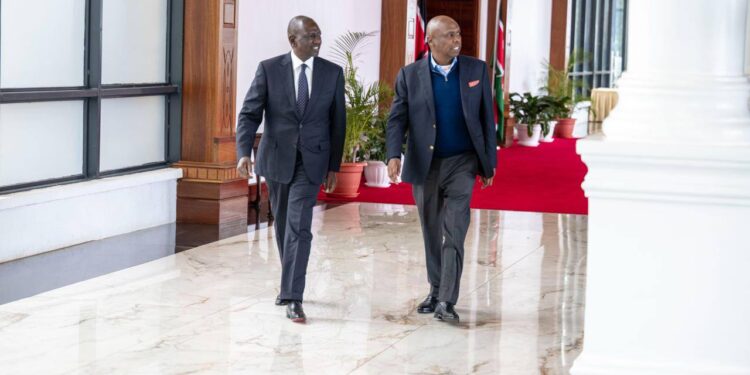
Kiharu MP Ndindi Nyoro. Photo/X
By Newsflash Repoter
NAIROBI, Kenya – Kiharu MP and former Parliamentary Budget Committee chair Ndindi Nyoro has intensified his criticism of the government’s housing levy, revealing that despite collecting Sh73.2 billion from Kenyans in the 2024/25 financial year, the construction sector has actually recorded negative growth since the levy’s introduction.
Speaking at the release of the 2025 Mid-Year Economic Report by the Institute of Public Finance in Nairobi on Monday, Nyoro presented data showing that the very sector the levy was meant to support has deteriorated significantly, contrasting sharply with previous years of robust growth without the additional tax.
Sector Performance Contradictions
Nyoro challenged the government’s narrative on the levy’s success, pointing to official Kenya National Bureau of Statistics (KNBS) data showing the construction sector declined by 0.7 per cent in 2024, compared to a 3.0 per cent growth the previous year. The figures become even more stark when examining key performance indicators.
“In the same year the government claimed to be ramping up housing projects, cement consumption fell by 7.9 per cent, alongside reduced steel usage,” Nyoro stated, questioning the fundamental effectiveness of the Affordable Housing Act 2024 that requires both employers and employees to contribute 1.5 per cent of their monthly gross earnings.
Employment Data Exposes Contradictions
The lawmaker particularly challenged the government’s job creation claims, presenting employment data that contradicted official assertions. “I have seen government officials saying the housing project has created 300,000 jobs; others say half a million jobs. Now, the same government data shows us this,” Nyoro said.
KNBS data revealed that private sector employment in construction actually fell from 226,300 in 2023 to 223,400 in 2024, while public sector employment saw only a minimal increase from 9,700 to 9,900 during the same period.
Read More: Ichung’wah: Wamuchomba is State informer on Gachagua’s plans
Questioning Economic Efficiency
Nyoro argued that the collected funds would have been more economically productive if left with Kenyans. “The government is collecting Sh73 billion, literally taking Sh73 billion from the private sector and households. Now what is the output?” he asked rhetorically.
“Many times, we may be beating drums on this side for celebration, but the economy cannot be cheated. What this is showing is that the money for the housing levy was more efficient for our economy when it was in the pockets of Kenyans,” Nyoro asserted, suggesting that private construction would have been more effective than government-led projects.
Read More: Gachagua Pledges to scrap housing levy, focus on debt recovery
Visual Progress Versus Statistical Reality
The MP addressed the disconnect between visible project advertisements and statistical evidence, noting: “Kenyans were building their houses more efficiently than the government could build them. Because the pictures we see on the timelines on social media, advertisements of housing projects, should translate into data. But then we see photographs.”
Nyoro’s criticism comes at a time when the housing levy has become increasingly controversial, with many Kenyans questioning its effectiveness and economic impact. His use of official government data to challenge the policy’s success adds significant weight to the ongoing debate about the levy’s future.
The presentation of concrete economic data against the government’s performance claims marks a significant development in the housing levy debate, potentially influencing both public opinion and parliamentary discussions about the policy’s continuation.



